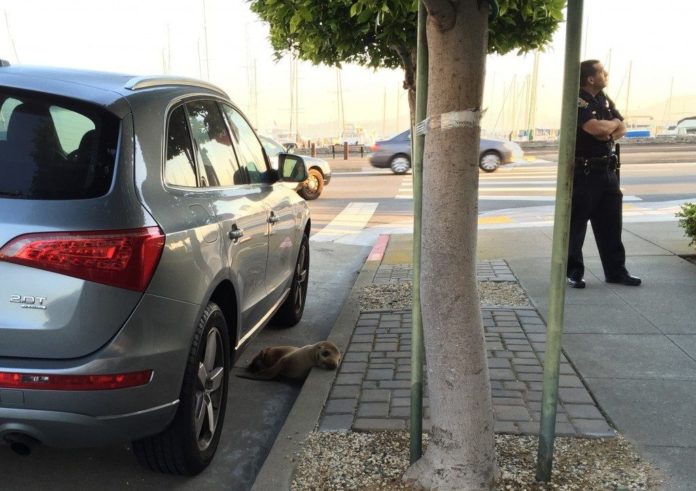Man, this sea lion has had a pretty tough go of it.
This adorable little guy — nicknamed “Rubbish” — was spotted hiding under a parked car in San Francisco’s Marina neighborhood Thursday morning and then promptly rescued, according to the Santa Barbara Marine Mammal Center.
Judging by a photo, he looked pretty bummed to be out and about. And we don’t blame him! It turns out that Rubbish had been rescued once before and treated by the center back in February. He was 8 months old then, weighing just 30 pounds and suffering from pneumonia and malnutrition.
Veterinarians and volunteers nursed Rubbish back to health, and five weeks older and 27 pounds heavier, released him back to the wild.
Now that he’s back on land, he’s 17 pounds lighter than the last time he made an appearance.
Rubbish is part of a much bigger crisis, researchers and advocates say, as record numbers of sea lions have washed up on California’s shores thanks to changing wind patterns and warmer ocean waters. These creatures, top predators, serve as indicators of what else is happening in the ocean, said Shawn Johnson, director of Veterinary Science at the Marine Mammal Center.
“We know everything is connected — a change in the winds is leading to thousands of sea lions stranding on the beach,” Johnson said in a statement.
Warmer coastal waters mean fish have moved to deeper water, or to the west or north. In turn, mother sea lions have had to venture further out to feed, leaving pups alone on the island where they were born for longer periods of time.
“Their pups gets so hungry and desperate that they leave the island before mom gets back,” said Marine Mammal Center spokeswoman Laura Sherr.
As The Washington Post’s Rachel Feltman has written, some experts have pointed to climate change as the culprit:
[begin ital]
This year more than 1,450 pups washed ashore. More than five times the number rescued by this point in 2013 have turned up, and things are so dire that the National Oceanic and Atmospheric Administration has warned California residents that calls to the authorities about pup sightings may go unanswered. Sea World has shut down its sea lion shows to donate experts to the cause, but they still can’t keep up with the flood of helpless, underweight babies.
[end ital]
The Marine Mammal Center has rescued more than 900 such animals this year, already surpassing the total number rescued in all of 2014 and continuing a three-year trend, Sherr said.
“What’s scary is that we don’t know when this will end,” Johnson said. “This could be the new normal — a changed environment that we’re dealing with now.”
It’s not uncommon for sea lions to hang out in the yacht harbor near the touristy Pier 39, says Sherr. It looks like Rubbish stopped before he even got to that part of the bay. “What’s not as common is for him to leave the water and come onto the street and cross the street,” Sherr said.
People quickly called the center, and police showed up to stand guard and keep him safe from cars and whatnot. Then rescuers began working to capture the frightened fellow, who had by that time taken refuge under an Audi.
Rubbish had been tagged from the last time he was treated, so that’s how veterinarians knew they had dealt with him before.
Last time he was rescued, Rubbish was so low on body fat that he caught pneumonia. He’s currently being assessed to see what kind of care he needs before he’s released back into the wild once more.
—






